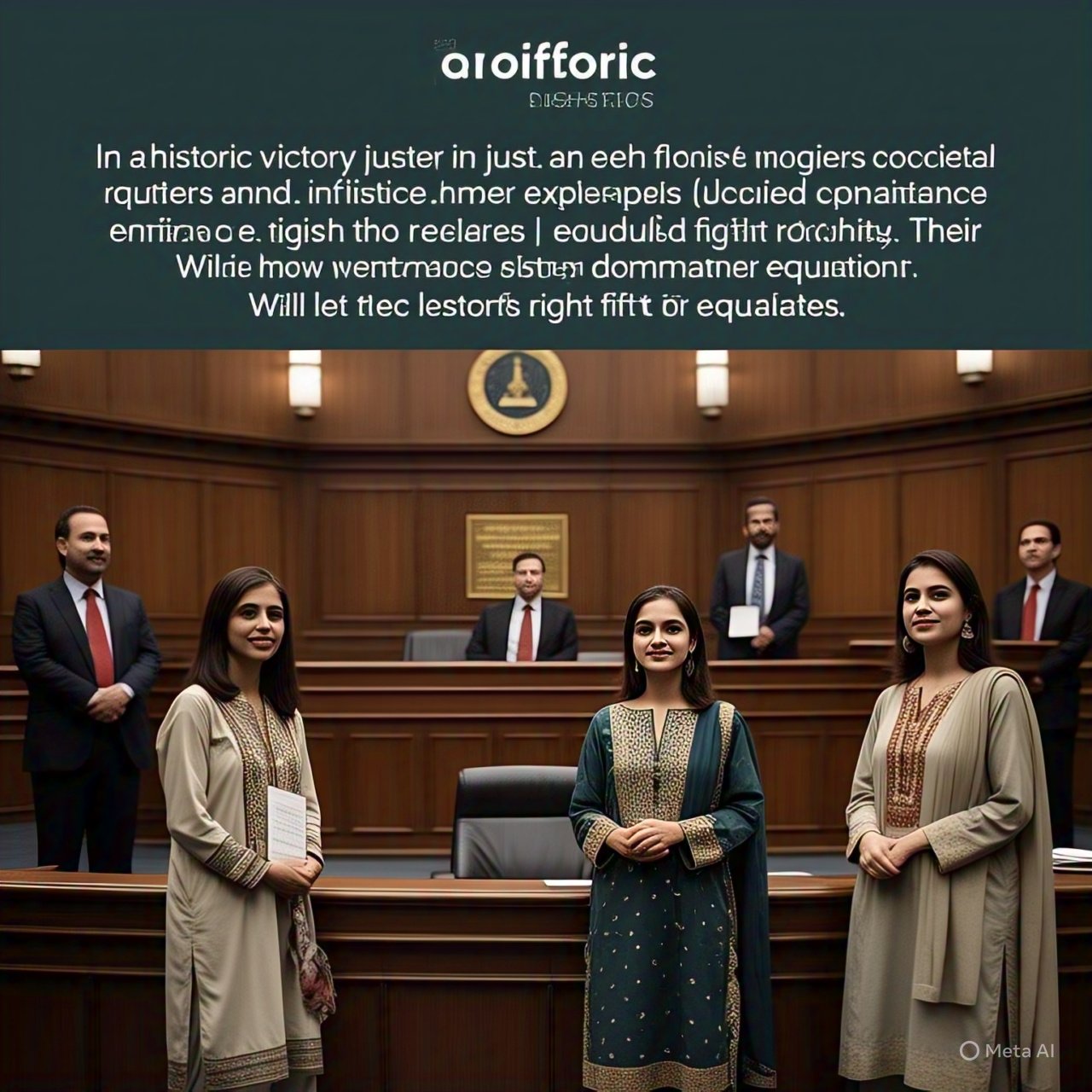
Protecting Women from Workplace Harassment: A Landmark Judicial Decision in Pakistan
The Pursuit of Justice: A Judicial Example of Protecting Women from Harassment in the Workplace
The purpose of courts is not only to deliver verdicts but also to provide justice to citizens. This is precisely what we see in this judicial decision, where the court delivered a strong verdict to protect the dignity and honor of a female employee. This case provides us with an understanding of the fundamental rights of women in the workplace, the complexities of the legal system, and the principles of justice.
انصاف کی جستجو: کام کی جگہ پر خواتین کو ہراسانی سے بچانے کی ایک عدالتی مثال
عدالتوں کا مقصد صرف فیصلہ سنانا نہیں ہوتا بلکہ شہریوں کو انصاف فراہم کرنا بھی ہوتا ہے۔ یہی بات ہمیں اس عدالتی فیصلے میں نظر آتی ہے، جہاں ایک خاتون ملازمہ کی عزت و وقار کے تحفظ کے لیے عدالت نے ایک مضبوط فیصلہ سنایا۔ یہ مقدمہ ہمیں کام کی جگہ پر خواتین کے بنیادی حقوق، قانونی نظام کی پیچیدگیوں اور انصاف کے اصولوں کی سمجھ فراہم کرتا ہے۔
| عدالتی فیصلہ پر اردو بلاگ | |||||
| عدالتی فیصلے کا حوالہ نمبر | 2024PLD795 | Women Harassment خواتین کو ہراساں کرنا | |||
| کس عدالت نے کیس سنا | سپریم کورٹ آف پاکستان | ||||
| جن جسٹس صاحبان نے کیس سنا | منیب اختر ،عائشہ اے ملک اور شاہد وحید | ||||
| جوابی درخواست گزاران | درخواست گزاران | ||||
| مس تہمینہ یاسمین اور — مدعا علیہان | بنام | راجہ تنویر صفدر — درخواست گزار | |||
| فیصلہ لکھنے والا جسٹس | عائشہ اے ملک | ||||

Case Details and Background
This case was between Raja Tanveer Safdar and Mrs. Tahmina Yasmin, in which the petitioner challenged the orders of the Governor of Punjab and the Ombudsman. Mrs. Tahmina Yasmin, a special education teacher, accused the petitioner of sexual harassment at the workplace. This case references the violation of the principle of double jeopardy, which aims to ensure that a person is not punished multiple times for the same offense. The court carefully reviewed the case and ruled that the principle of double jeopardy does not apply here.
مقدمے کی تفصیل اور پس منظر
یہ مقدمہ راجہ تنویر صفدر اور مسز تہمینہ یاسمین کے درمیان تھا، جس میں درخواست گزار نے گورنر پنجاب اور محتسب کے احکامات کو چیلنج کیا تھا۔ مسز تہمینہ یاسمین، جو کہ ایک اسپیشل ایجوکیشن ٹیچر ہیں، نے درخواست گزار پر کام کی جگہ پر جنسی ہراسانی کا الزام عائد کیا۔ یہ کیس دوہری سزا (double jeopardy) کے اصول کی خلاف ورزی کا حوالہ دیتا ہے، جس کا مقصد یہ ہے کہ کسی شخص کو ایک ہی جرم کے لیے ایک سے زیادہ بار سزا نہ دی جائے۔ عدالت نے اس مقدمے کا تفصیلی جائزہ لیا اور فیصلہ سنایا کہ دوہری سزا کا اصول اس کیس پر لاگو نہیں ہوتا۔
Arguments by the Petitioner’s Lawyer
The petitioner’s lawyer argued that their client had already been punished under the PEEDA Act, and initiating proceedings again under the 2010 Act was illegal. They referred to Article 13(a) of the Constitution, stating that the principle of double jeopardy applies to this case, and punishing the petitioner twice for the same charge violates constitutional rights. The lawyer also argued that including their client’s official conduct in a defamation case was unjust.
درخواست گزار کے وکیل کے دلائل
درخواست گزار کے وکیل نے یہ دلیل دی کہ ان کے موکل پر پیڈا ایکٹ کے تحت پہلے ہی سزا عائد کی جا چکی ہے، اور اب 2010 کے ایکٹ کے تحت دوبارہ کارروائی کرنا غیر قانونی ہے۔ انہوں نے آئین کے آرٹیکل 13(a) کا حوالہ دیتے ہوئے کہا کہ دوہری سزا کا اصول اس کیس پر لاگو ہوتا ہے اور درخواست گزار کو ایک ہی الزام کے تحت دو بار سزا دینا آئینی حقوق کی خلاف ورزی ہے۔ وکیل نے یہ بھی کہا کہ ہتک عزت کے مقدمے میں ان کے موکل کی سرکاری حیثیت میں کی گئی کارروائی کو شامل کرنا ناانصافی ہے۔
Arguments by the Respondent’s Lawyer
The respondent’s lawyer tried to convince the court that the charges of defamation and harassment against the petitioner were two separate cases and fell under different jurisdictions. They stated that the defamation case was filed under the 2002 Defamation Ordinance, while the harassment complaint was made under the 2010 Act. They assured the court that these were two distinct legal aspects and combining them would be incorrect.
جواب دہندہ کے وکیل کے دلائل
جواب دہندہ کے وکیل نے عدالت کو اس بات پر قائل کرنے کی کوشش کی کہ درخواست گزار کے خلاف ہتک عزت اور ہراسانی دو علیحدہ علیحدہ مقدمے ہیں اور ان کا دائرہ اختیار مختلف قوانین کے تحت ہے۔ انہوں نے کہا کہ 2002 کے ہتک عزت آرڈیننس کے تحت مقدمہ دائر کیا گیا اور 2010 کے ایکٹ کے تحت ہراسانی کی شکایت کی گئی۔ انہوں نے عدالت کو یقین دلایا کہ یہ دو مختلف قانونی پہلو ہیں اور انہیں ایک ساتھ جوڑنا غلط ہوگا۔
Court’s Analysis and Legal Point
The court carefully listened to the arguments of both parties and emphasized that the principle of double jeopardy was explained in the Muhammad Ashraf case. This principle clarifies that a person cannot be punished multiple times for the same crime unless the crime and evidence are identical. The court applied this principle to the case, noting that the PEEDA Act and the 2010 Act operate within separate scopes and are based on different legal principles.
عدالت کا تجزیہ اور قانونی نکتہ
عدالت نے فریقین کے دلائل کو بغور سنا اور اس بات پر زور دیا کہ محمد اشرف کیس میں دوہری سزا کے اصول کی وضاحت کی گئی تھی۔ یہ اصول اس بات کی وضاحت کرتا ہے کہ کسی شخص کو ایک ہی جرم پر ایک سے زیادہ بار سزا نہیں دی جا سکتی، جب تک کہ جرم اور شواہد دونوں ایک جیسے نہ ہوں۔ عدالت نے اس اصول کو اس کیس پر لاگو کرتے ہوئے دیکھا کہ پیڈا ایکٹ اور 2010 کا ایکٹ اپنے دائرہ کار میں علیحدہ علیحدہ کام کرتے ہیں اور ان کا مقصد مختلف قانونی اصولوں پر مبنی ہے۔
Court’s Decision and Its Legal Implications
The court rejected the petitioner’s argument, stating that the PEEDA Act and the 2010 Act are separate laws and apply to different situations. The petitioner was punished under the PEDA Act for misconduct, while the punishment under the 2010 Act was for proven workplace harassment. The court ruled that the objectives and legal jurisdictions of these two laws are different, so they are not related to the principle of double jeopardy.
عدالت کا فیصلہ اور اس کے قانونی نتائج
عدالت نے درخواست گزار کی دلیل مسترد کرتے ہوئے کہا کہ پیڈا ایکٹ اور 2010 کے ایکٹ دونوں قوانین الگ ہیں اور ان کا اطلاق مختلف حالات میں ہوتا ہے۔ پیڈا ایکٹ میں درخواست گزار کی بدعملی پر سزا دی گئی تھی، جبکہ 2010 کے ایکٹ کے تحت کام کی جگہ پر ہراسانی کا الزام ثابت ہونے پر سزا دی گئی۔ عدالت نے کہا کہ ان دونوں قوانین کا مقصد اور ان کا قانونی دائرہ کار مختلف ہے، اس لیے ان کا دوہری سزا کے اصول سے کوئی تعلق نہیں۔
Constitutional Rights and the Principle of Justice
The court also clarified that under Article 10A of the Constitution, every citizen has the right to a fair trial. The court emphasized that to ensure justice, courts must avoid unnecessary delays in cases, making the judicial system effective and fair. The court stressed that the purpose of the legal system is to establish justice and provide citizens with their rights.
Message to Citizens: Stand Up for Your Rights
This verdict serves as a lesson for every Pakistani citizen: if you face any form of harassment or mistreatment at the workplace, the law is there to support you. The Ombudsman and other forums have been established to provide justice. This judicial decision reminds us that no one should compromise their dignity and honor. If an individual needs to protect their rights, they should fearlessly pursue legal action.
آئینی حقوق اور انصاف کا اصول
عدالت نے اس بات کو بھی واضح کیا کہ آئین کے آرٹیکل 10A کے تحت ہر شہری کو منصفانہ سماعت کا حق حاصل ہے۔ عدالت نے کہا کہ انصاف کی فراہمی کے لیے ضروری ہے کہ عدالتیں مقدمات کو بلاوجہ طوالت نہ دیں، تاکہ عدلیہ کا نظام موثر اور عادلانہ ہو۔ عدالت نے زور دیا کہ قانونی نظام کا مقصد انصاف کا قیام اور شہریوں کو ان کے حقوق کی فراہمی ہے۔
شہریوں کے لیے پیغام: اپنے حقوق کے لیے آگے بڑھیں
یہ فیصلہ ہر پاکستانی شہری کے لیے ایک سبق آموز مثال ہے کہ اگر آپ کو کام کی جگہ پر کسی قسم کی ہراسانی یا بدسلوکی کا سامنا ہو تو قانون آپ کی مدد کے لیے موجود ہے۔ محتسب اور دیگر فورمز آپ کو انصاف دلانے کے لیے قائم کیے گئے ہیں۔ یہ عدالتی فیصلہ ہمیں یہ یاد دلاتا ہے کہ کسی کو بھی اپنے وقار اور عزت پر سمجھوتہ نہیں کرنا چاہیے۔ اگر کسی فرد کو اپنے حقوق کے تحفظ کی ضرورت ہو تو وہ بے خوف ہو کر قانونی جدوجہد کرے۔
Conclusion
This case and its verdict clearly reflect the principles of providing justice and protecting citizens’ rights. The court delivered its decision based on evidence and explained the principle of double jeopardy in detail. This verdict sends a message to every citizen seeking justice that the legal system is there to support you. It encourages us to stand up for our rights and not retreat in the pursuit of justice.
نتیجہ
یہ مقدمہ اور اس کا فیصلہ انصاف کی فراہمی اور شہریوں کے حقوق کے تحفظ کے اصولوں کی واضح عکاسی کرتا ہے۔ عدالت نے اس مقدمے میں شواہد کی بنیاد پر فیصلہ سنایا اور دوہری سزا کے اصول کو تفصیل سے سمجھایا۔ یہ فیصلہ ہر اس شہری کو ایک پیغام دیتا ہے جو انصاف کی تلاش میں ہے کہ قانونی نظام آپ کی مدد کے لیے موجود ہے۔ یہ فیصلہ ہمیں ترغیب دیتا ہے کہ ہم اپنے حقوق کے لیے کھڑے ہوں اور انصاف کی جدوجہد میں پیچھے نہ ہٹیں۔





